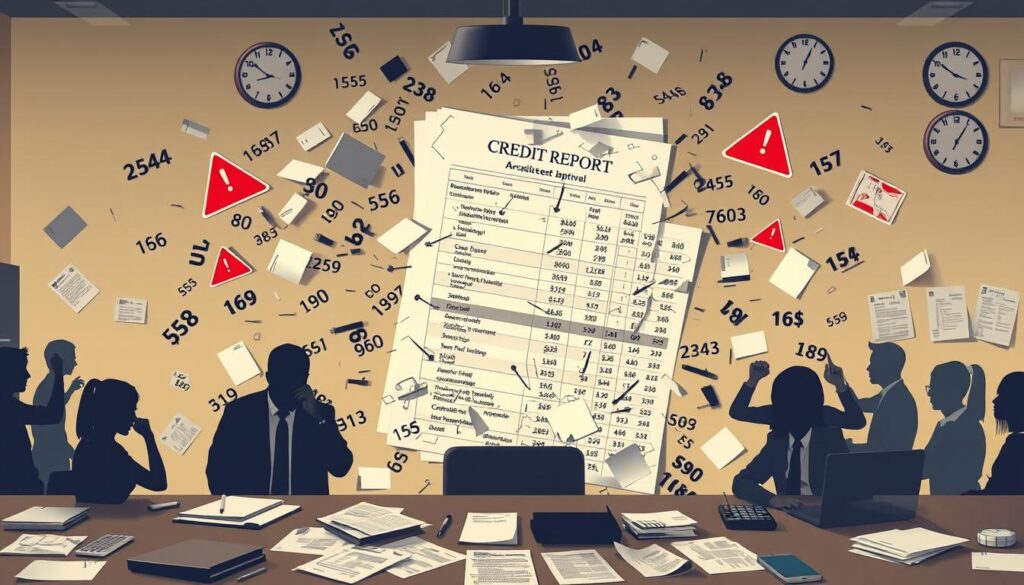A clean credit report is vital for your financial health. It affects your ability to get loans, credit cards, housing, and jobs. Credit report errors happen often and can cause serious problems.
Luckily, legal protections and resources exist to help fix these mistakes. You can take charge of your financial future by addressing these inaccuracies promptly.
Key Takeaways
- Understand your rights under the Fair Credit Reporting Act (FCRA) to dispute inaccurate information on your credit report
- Learn about the steps you can take to file a dispute with credit bureaus and creditors
- Explore the role of credit repair services and consumer advocacy groups in resolving credit report errors
- Discover strategies for rebuilding your credit score after errors are corrected
- Understand the impact of credit report errors on lending decisions and the importance of maintaining a clean credit history
Understanding Credit Report Errors
Credit reports are vital for our finances, but they can have mistakes. These errors come in different forms, from wrong account info to identity theft issues. Studies show that up to 25% of credit reports contain errors that can hurt credit scores.
Common Inaccuracies and Mistakes
Some of the most common credit report errors include:
- Accounts that are incorrectly reported as delinquent or in collections
- Accounts that belong to someone else, often due to identity theft or mix-ups
- Incorrect personal information, such as incorrect name, address, or Social Security number
- Duplicate accounts or accounts that have been closed but still appear as open
- Inaccurate reporting of credit limits or balances
Consequences of Credit Report Errors
Credit report errors can have serious effects on your life. Wrong credit data can lower your credit score, making it harder to get loans or credit cards.
These mistakes can even affect your job or housing options. Credit bureau mistakes might lead to higher interest rates or denied financial services. The financial consequences can be huge, potentially costing you thousands over time.
“Errors on credit reports can haunt consumers for years, making it harder for them to get credit, jobs, or even places to live.”
Your Rights Under the Fair Credit Reporting Act
The Fair Credit Reporting Act (FCRA) protects consumers’ rights regarding their credit reports. It ensures accuracy and fairness of credit information. This federal law provides various protections for individuals.
The FCRA allows you to dispute incorrect or incomplete information on your credit report. Credit bureaus must investigate these disputes within 30 to 45 days. They are required to fix any proven errors.
You can access your credit reports for free once a year. This helps you monitor your credit information and spot any issues. It’s a great way to maintain your credit profile.
Credit bureaus must follow strict rules when handling your information. They have limits on what data they can include. The information must be accurate, current, and fair.
Knowing your FCRA rights helps you protect your credit. You can address issues more effectively. This is crucial for maintaining a healthy credit profile.
Key Provisions of the Fair Credit Reporting Act
- Right to dispute inaccurate or incomplete information on your credit report
- Credit bureaus must investigate disputes and correct verified errors within a specified time frame
- Consumers have the right to access their credit reports for free annually
- Credit bureaus must follow strict guidelines for collecting, storing, and reporting credit information
- Limitations on the types of data that can be included in a credit report
- Requirement for credit information to be accurate, up-to-date, and fair
“The Fair Credit Reporting Act is a powerful tool that empowers consumers to take control of their credit profiles and ensure the accuracy of the information being reported about them.”
| Key FCRA Provisions | Consumer Rights |
|---|---|
| Right to Dispute Errors | Consumers can dispute inaccurate or incomplete information on their credit reports, and credit bureaus must investigate and correct verified errors. |
| Free Annual Credit Reports | Consumers are entitled to receive a free copy of their credit report from each of the three major credit bureaus once a year. |
| Credit Report Accuracy | Credit bureaus must ensure the information they collect, store, and report is accurate, up-to-date, and fair. |
| Dispute Investigation Timeframe | Credit bureaus must investigate and respond to consumer disputes within a specified time frame, typically 30 to 45 days. |
When to Seek Professional Assistance
Some credit report errors can be fixed on your own. However, complex issues may require professional help. Credit repair services, consumer rights groups, or legal experts can offer valuable assistance.
Consider legal help for credit report errors causing major financial problems. These errors can affect loans, housing, and job prospects. A consumer credit law expert can protect your rights and speed up corrections.
Professional guidance is useful for overwhelming credit report issues. Credit counseling services can provide insights and support. They increase your chances of resolving disputes successfully.
| Scenario | Benefit of Professional Assistance |
|---|---|
| Significant financial hardship due to credit report errors | Legal expertise to protect your rights and ensure timely resolution |
| Complex or persistent credit report issues | Guidance, resources, and support from credit repair services or advocacy groups |
The impact of credit report errors should guide your decision to seek help. Explore your options to address these issues effectively. Take control of your credit profile and secure your financial future.
Disputing Credit Report Errors on Your Own
You can challenge mistakes on your credit report directly with credit bureaus. This process is your legal right. Follow these steps for a successful resolution.
Steps to File a Credit Report Dispute
- Gather supporting documentation: Collect any evidence, such as bills, statements, or correspondence, that demonstrates the errors on your credit report.
- Contact the credit bureaus: Write a detailed letter explaining the specific errors and include the supporting documents. You can submit your dispute online, by mail, or by phone, depending on the credit bureau’s preferred method.
- Initiate the credit bureau investigation: The credit bureau must investigate your dispute and respond within 30 days. During this time, the item in question will be flagged as “disputed” on your credit report.
- Monitor the investigation process: Keep a close eye on the status of your dispute and follow up with the credit bureau if you don’t receive a timely response or resolution.
- Request corrections: If the credit bureau confirms the error, they must correct the information on your credit report. Ensure the changes are accurately reflected in your credit history.
Don’t give up if your first dispute fails. You can take further action. Consider contacting consumer groups or seeking legal help.

Fixing credit report errors protects your credit score. It ensures accurate information for lending decisions. This step is vital for a healthy financial future.
Hiring a Credit Repair Service
A credit repair service can help fix credit report errors and boost your credit score. These professionals tackle complex credit issues effectively. They offer a thorough approach to resolve inaccuracies and enhance your financial standing.
Credit repair services typically offer a range of services, including:
- Thorough review and analysis of your credit report
- Identification and documentation of credit report errors
- Effective dispute submission to credit bureaus on your behalf
- Ongoing monitoring and follow-up to ensure errors are corrected
- Advice and guidance on building and maintaining a strong credit profile
The benefits of using credit repair experts often outweigh the costs. These companies have the know-how to tackle credit report errors efficiently. They can help you improve your credit score more quickly than you might on your own.
| Service | Description | Average Cost |
|---|---|---|
| Credit Report Review | Detailed analysis of your credit report to identify errors and inaccuracies | $59 – $99 |
| Dispute Submission | Preparation and submission of disputes to credit bureaus on your behalf | $99 – $199 per dispute |
| Ongoing Monitoring | Continuous monitoring of your credit report and follow-up on disputes | $79 – $99 per month |
Take time to research different credit repair services. Look for companies that offer free consultations and clear pricing. This helps you choose a service that fits your needs and budget best.
The Role of Consumer Rights Advocacy Groups
Consumer rights advocacy groups ensure credit report accuracy and hold credit bureaus accountable. They address systemic errors and fight for stronger consumer protections. These organizations work to improve credit data accuracy through various means.
Organizations Fighting for Accurate Credit Data
Key groups include the National Consumer Law Center (NCLC), Consumer Financial Protection Bureau (CFPB), and Consumer Rights Advocates. They investigate errors, challenge unfair practices, and push for reforms in credit reporting.
The NCLC leads in consumer rights advocacy, pushing for stricter credit data accuracy rules. The CFPB investigates complaints and enforces the Fair Credit Reporting Act.
“Accurate credit data is essential for consumers to access fair and affordable credit. These advocacy groups play a crucial role in ensuring that the credit reporting system works for the people, not against them.”
These organizations raise awareness, file lawsuits, and work with lawmakers. Their efforts improve credit data accuracy and credit bureau oversight for consumers.

Rebuilding Your Credit After Errors are Fixed
It’s time to focus on improving your credit score after fixing errors. Credit score improvement and credit history restoration are key for healthy financial management. These strategies will help you regain control of your finances.
Keep a close eye on your credit report. Make sure fixed errors stay corrected and no new issues pop up.
Pay all your bills on time, every time. This is crucial for boosting your credit score.
- Monitor your credit report regularly: Continue to closely monitor your credit report to ensure that any previously identified errors remain corrected and that no new issues arise.
- Establish a consistent payment history: Make all of your payments on time, every time. This is one of the most important factors in improving your credit score.
- Utilize credit-building tools: Consider becoming an authorized user on someone else’s credit card or applying for a secured credit card to help build your credit history.
- Maintain low credit card balances: Keep your credit card balances low, ideally below 30% of your total available credit.
- Diversify your credit mix: Having a mix of different types of credit, such as credit cards, loans, and mortgages, can also help improve your credit score.
Stay committed to your credit history restoration efforts. This will help improve your credit score over time.
Keep working on rebuilding your financial standing. Your diligence will pay off in the long run.
| Credit Rebuilding Strategy | Description | Impact on Credit Score |
|---|---|---|
| Consistent On-Time Payments | Make all payments on time, every time | Significant positive impact |
| Utilization Ratio Reduction | Keep credit card balances below 30% of available credit | Moderate positive impact |
| Credit Mix Diversification | Maintain a variety of credit types (cards, loans, mortgages) | Small positive impact |
| Authorized User Accounts | Become an authorized user on someone else’s credit card | Moderate positive impact |
Rebuilding credit takes time and effort. Be patient and keep up good financial management habits.
Your credit history restoration work will pay off. Stay focused on your goals and you’ll see results.
Preventing Future Credit Report Mistakes
Keeping your credit report accurate is vital. It helps avoid hassles and problems from errors. Regular monitoring is key to spotting and fixing issues quickly.
By staying alert, you protect your finances. You can also prevent identity theft from harming your credit data.
Monitoring Your Credit Regularly
Check your credit report from all three major bureaus yearly. This gives you a full view of your credit history.
You’ll be able to spot any odd activity or mistakes quickly. This approach ensures you understand your credit situation completely.
- Sign up for a credit report monitoring service to receive alerts about changes to your credit profile.
- Check your credit data security by monitoring your credit scores and keeping an eye out for any unexplained fluctuations.
- Be vigilant for signs of identity theft, such as unfamiliar accounts or inquiries on your report, and address them promptly.
Make credit report monitoring a habit. It helps you stay ahead of potential issues.
This proactive approach maintains your credit data’s integrity. It can save you time, money, and stress in the long run.

“Monitoring your credit report regularly is the best way to catch errors or signs of identity theft early on. It’s a simple yet powerful step to protect your financial well-being.”
| Benefit | Impact |
|---|---|
| Early detection of credit report errors | Minimizes the time and effort required to dispute and resolve inaccuracies |
| Proactive identity theft prevention | Safeguards your credit data and financial reputation |
| Improved credit data security | Maintains the integrity of your credit history for better lending decisions |
Legal Options for Persistent Credit Report Errors
Sometimes, credit report errors persist despite efforts to resolve them. Legal action may be necessary to seek justice and compensation. The Fair Credit Reporting Act (FCRA) allows consumers to sue credit agencies for inaccurate information.
FCRA lawsuits can lead to error corrections and removal of negative items. Consumers may receive compensation for actual damages like lost job opportunities. Statutory damages up to $1,000 per violation are possible. Punitive damages may be awarded for willful noncompliance.
| Potential Legal Outcomes | Compensation |
|---|---|
| Correction of credit report errors | Actual damages (lost job opportunities, higher interest rates) |
| Removal of negative items | Statutory damages (up to $1,000 per violation) |
| Punitive damages (for willful noncompliance) | Punitive damages |
Legal action can be complex, so work with an experienced consumer rights attorney. They can navigate the system and protect your FCRA rights. Gathering evidence is crucial for a strong case.
Legal action should be a last resort for credit report errors. It can resolve individual issues and improve the credit reporting system. By holding agencies accountable, we can promote fairness in credit reporting.
The Impact of Credit Report Errors on Lending Decisions
Lenders heavily rely on credit reports and scores to assess financial trustworthiness. These reports are crucial indicators of a person’s reliability. Credit report errors can severely affect lending decisions, often with negative consequences.
Importance of a Clean Credit History
Accurate credit reports help lenders evaluate creditworthiness and make informed decisions. A clean credit history free of errors or derogatory information is vital for accessing the best financial opportunities.
Credit report errors can result in higher interest rates, loan denials, or inability to obtain credit. These errors significantly impact a person’s credit score and financial prospects.
A Federal Trade Commission study found that one in five consumers has a credit report error. These errors can include incorrect late payments, wrong account information, or identity theft issues.
“Your credit report is the foundation upon which lenders build their decisions. Errors on this report can have a devastating impact on your ability to secure the credit and financial opportunities you deserve.”
A clean credit history is essential for securing low-interest mortgages and favorable auto loan terms. It can even impact job prospects. Credit report errors can hinder these opportunities.

Success Stories: Resolving Credit Report Errors
Credit report errors can be overwhelming, but many have overcome them. These inspiring stories show how people fixed inaccuracies and improved their financial futures.
Emily found a wrong late payment on her report. She was surprised, as she always paid on time. Emily disputed the error with proper documentation.
The credit bureau investigated and removed the mistake. As a result, Emily’s credit score improvement was significant.
David, a small business owner, faced a different challenge. A creditor wrongly reported an unpaid debt on his report. He tried calling and writing, but got no response.
David then sought help from a consumer rights advocacy group. They guided him through the dispute process. Within months, the error was fixed.
David’s credit score improvement helped his business secure important financing.
“The sense of relief and empowerment I felt after resolving the credit report error was immeasurable. It’s a testament to the power of persistence and the importance of standing up for one’s financial rights.”
These consumer testimonials show the power of knowledge and determination. With the right approach, anyone can fix credit report error resolution issues.
Working with Credit Counseling Agencies
Credit counseling agencies offer valuable help with credit report errors and financial challenges. They provide debt management planning, financial education, and advice on rebuilding credit. These services can support other strategies for fixing credit report issues.
These agencies employ certified professionals to assist with debt and credit problems. They can create plans to manage debts, talk to creditors, and boost credit scores.
Credit counseling agencies also offer comprehensive financial education programs. These programs teach clients how to make smart money choices and avoid future credit report errors. Workshops on budgeting and credit-building are key parts of these resources.
For ongoing credit report errors, these agencies can guide you through the dispute process. They can also help you rebuild a clean credit history. Working with them gives you access to expert knowledge in credit counseling and debt management.
Credit counseling agencies are vital allies against credit report errors. They offer a complete approach to financial health and credit repair. Using their services can help you build a stronger financial future.
The Role of Credit Bureaus in Error Resolution
Credit bureaus are key players in fixing credit report errors. Experian, Equifax, and TransUnion have duties under the Fair Credit Reporting Act. They must investigate and correct wrong information on consumer credit reports.
Responsibilities of Major Credit Bureaus
The FCRA requires credit bureaus to ensure accurate information. They must investigate when consumers dispute errors on their credit reports. Bureaus need to verify disputed info and fix any mistakes.
This process protects credit report accuracy and upholds consumer rights. It’s vital for maintaining fair credit reporting practices.
- Conduct thorough investigations of disputed items on credit reports
- Verify the accuracy of information with the data furnishers (such as lenders and creditors)
- Correct any errors or inaccuracies found on consumers’ credit reports
- Provide consumers with the results of the investigation and the actions taken
- Maintain a dispute process that is accessible and responsive to consumers
Credit bureaus ensure the integrity of credit reporting. They protect consumers from harmful credit report errors. Their role is crucial in maintaining a fair financial system.
Debt Relief Assistance for Credit Report Issues
Credit report errors can worsen financial hardship. Luckily, various options exist to ease debt and fix credit report mistakes. These solutions can help people regain control of their finances.
Debt Management Programs
Credit counseling agencies offer debt management programs. These programs negotiate with creditors to reduce interest rates and lower monthly payments. They create a consolidated repayment plan to improve credit standing over time.
Debt Consolidation Loans
Debt consolidation loans simplify repayment for those with multiple debts. They combine debts into one loan, potentially lowering the overall interest rate. This allows people to focus on fixing credit report errors while managing debt.
Bankruptcy and Credit Report Errors
Bankruptcy may be necessary for severe financial hardship and credit report errors. It’s a last resort that can discharge or reorganize debt. This process provides a fresh start and a chance to rebuild credit.
| Debt Relief Solution | Key Benefits | Considerations |
|---|---|---|
| Debt Management Program | – Negotiated interest rate reduction – Consolidated monthly payments – Credit counseling support | – Requires creditor participation – May impact credit score temporarily |
| Debt Consolidation Loan | – Simplified repayment process – Potentially lower interest rate – Opportunity to focus on credit repair | – Requires good credit standing – May incur additional fees |
| Bankruptcy | – Discharge or reorganization of debt – Opportunity to rebuild credit profile | – Significant impact on credit score – Long-term financial implications |
These debt relief options can help those with credit report errors. They offer ways to regain financial control and address inaccuracies. By exploring these solutions, people can work towards a brighter financial future.
Conclusion
Fixing credit report errors needs a smart, active approach. Know your rights under the Fair Credit Reporting Act. Use legal resources to fight mistakes and protect your finances.
You can dispute errors alone or get help from credit repair pros. The key is to keep addressing any mistakes. This ensures your credit info is correct and helps you make smart money choices.
Credit report errors can hurt your chances of getting loans or jobs. They can even affect your housing options. By fixing these issues, you’re protecting your current and future finances.

